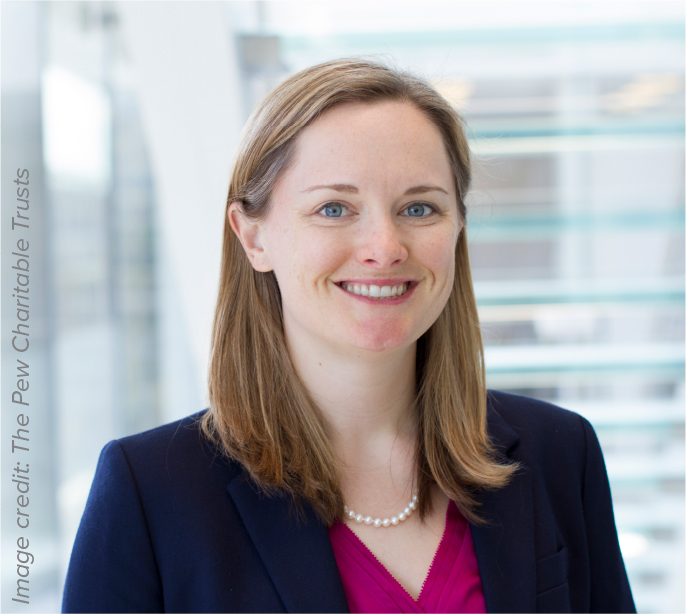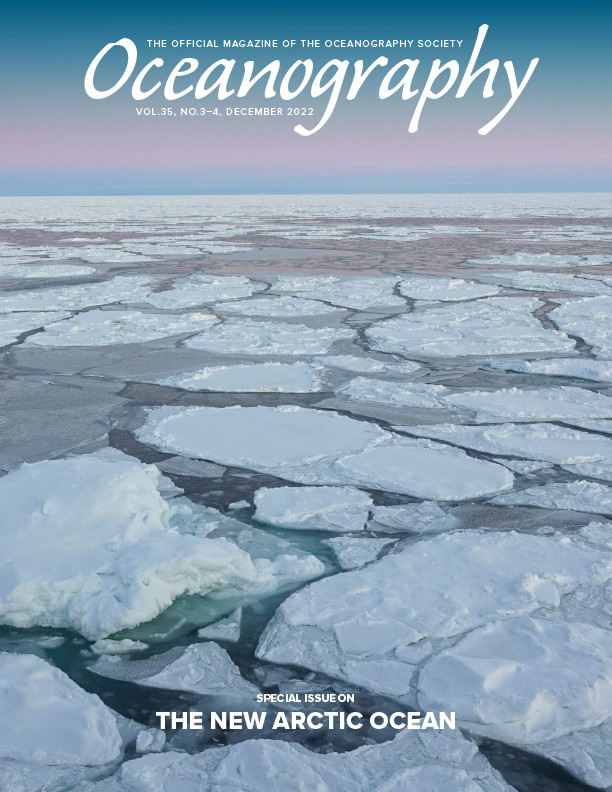Full Text
 |
SARAH CLOSE, Officer, Lenfest Ocean Program, The Pew Charitable Trusts
Degree: When, where, what, and what in?
After completing my bachelor’s degree in biology and environmental studies at Bowdoin College, I spent about two years in Seattle working for a small nonprofit focused on watershed restoration. I returned to academia and completed my PhD in zoology at Oregon State University in 2014. My dissertation research focused on understanding how oceanography and environmental conditions influence rocky intertidal communities across different spatial scales.
Did you stay in academia at all, and if so, for how long?
I went into academia knowing that I wanted the depth of research experience that it would offer but I was not set on following an academic career path. Early in my PhD, I learned about the year-long Knauss Policy Fellowship that places scientists in policy positions in the legislative and executive branches of the US government in Washington, DC. It sounded like a great way to try out a new field that I was interested in, so when I got close to finishing, I applied for the fellowship and was selected. I moved to DC to start the fellowship at NOAA just three weeks after defending my dissertation.
How did you go about searching for a job outside of the university setting?
The Knauss fellowship really opened doors for me, both in terms of building a professional network and learning a lot in a short period of time about what opportunities were out there and what interested me. During my fellowship and then working at NOAA for two years, I took note of the elements of my role that excited me and that I wanted to maintain as part of my career going forward. This was useful when the opportunity came along to move to the Lenfest Ocean Program. I had met my now-colleagues at a workshop while working at NOAA, and the more I learned about the Lenfest Ocean Program over the following years, the more I could see that it had the potential to be a great fit for me in the future. I kept in touch with the program, and my current position became available right around the time I was feeling ready for a new opportunity, so I applied, and the timing worked out very well.
Is this the only job (post-academia) that you’ve had? If not, what else did you do?
During my Knauss fellowship year I worked at NOAA’s Climate Program Office supporting the Regional Integrated Sciences and Assessments (RISA) program, a competitive grant program that funds regional teams around the country to conduct interdisciplinary research on climate impacts and adaptation. I loved my experience during the fellowship. I began talking to my manager early in the process about the potential of staying on at the end of the fellowship, and I was fortunate that there was a viable way for me to do that.
After my fellowship ended, I continued working at the Climate Program Office in support of the RISA program and also expanded my portfolio to work in the Coastal and Ocean Climate Applications (COCA) program as well. I had so many valuable experiences during my time in this role, including co-chairing the Adaptation Science Interagency Working Group at the US Global Change Research Program, co-editing a book that documented stories and case studies from across two decades of the RISA program, and getting to know a new field and new community of researchers dedicated to making science useful. In 2017, I left government and moved to The Pew Charitable Trusts. Leaving NOAA was a hard decision as I really believed in public service and the work we were doing, but I had a wonderful opportunity to grow my career.
What is your current job? What path did you take to get there?
I am a program officer at the Lenfest Ocean Program, which is managed by The Pew Charitable Trusts in Washington, DC, where I have worked since 2017. The program is centered on the concept that science is more likely to be used if it is designed to engage users from the beginning. I develop and manage a portfolio of research grants focused on understanding the impacts of climate change on the ocean and providing usable information to address these impacts.
My experience working with the RISA program at NOAA gave me the language to express what had always interested me about working at the science-policy interface and introduced me to a new way of doing science that meets the needs of stakeholders and decision-makers and is conducted hand-in-hand with the people who will use it. I learned so much about funding science, science policy, and usable science working at NOAA. But I was also often working on topical issues for which I had limited background—for example, around drought and water resources—and I missed working on marine systems. The opportunity to work for the Lenfest Ocean Program allowed me to continue working in usable science while also returning to my roots in marine science.
What did your oceanographic education (or academic career) give you that is useful in your current job?
To start with the obvious, graduate school taught me how to really dig into a topic, ask questions, and conduct and evaluate research—skills I use daily as a program officer. But doing research also prepared me for understanding and tracking project budgets, training and managing others, and managing projects by adhering to timelines and budgets. I also taught undergraduate lab courses as a TA, and while there’s really no context in which I still need to know how to dissect a pig (for which I’m thankful), I do use the skills I developed in teaching frequently when explaining and translating complicated concepts.
Is there any course or other training you would have liked to have had as part of your graduate education to meet the demands of the job market?
First, I want to point out that your training doesn’t stop after graduate school. There will be plenty of on-the-job learning and training opportunities that will allow you to expand your skillset. There are a few skills I would have benefited from during graduate school and in job searches had I learned them earlier. Facilitation skills are incredibly valuable and can be helpful in many different settings and contexts. In my experience, people who are good at facilitation are often highly sought after. I have also seen the value of trainings on self-assessment and understanding your strengths and how you work best, as well as how you can work most effectively with a diverse group of people, an area where there is always room for growth.
Is the job satisfying? What aspects of the job do you like best/least?
I love my job. It is a great fit for me in a few ways. I love working at the science-policy interface and being able to focus on scientific research, how the research is used, and how it can be designed to be most useful. I’m always learning new things as I frequently talk with people about their work and ideas as well as the obstacles they face in bringing science to bear on challenging issues. I enjoy working on climate adaptation—it’s a hard space to work in but it is also is very energizing, and so many amazing advances are being made. Finally, I really like working on a diversity of topics and in a range of regions and parts of the world, although staying on top of multiple fields and working on multiple topics simultaneously is also one of the most challenging parts of the job. Hands down, the thing I like the least about my job is turning down research applications for funding. I know how much thought and hard work goes into them, and they are always hard decisions on our end.
Do you have any recommendations for new grads looking for jobs?
Think about what you might like to do as well as what you want to learn or try. Regular self-reflection can help you be more prepared to identify opportunities that would be a good fit when you see them.
Talk to people. It’s sometimes hard to know where to start, but it truly is one of the best ways to start looking for a new job. It’s perfectly acceptable to cold-email people with whom you might like to talk in order to learn more about what they do, and you might be surprised how willing they may be to have conversations with you. And remember that your network also includes peers who can be great sources of information and advice.
Bear in mind that career paths often sound well planned and linear in retrospect, but the reality is that there are many different ways to create the career you want. Paying attention to what energizes and motivates you and knowing yourself is important, as is remembering that you don’t have to figure it out all at once or all on your own.

